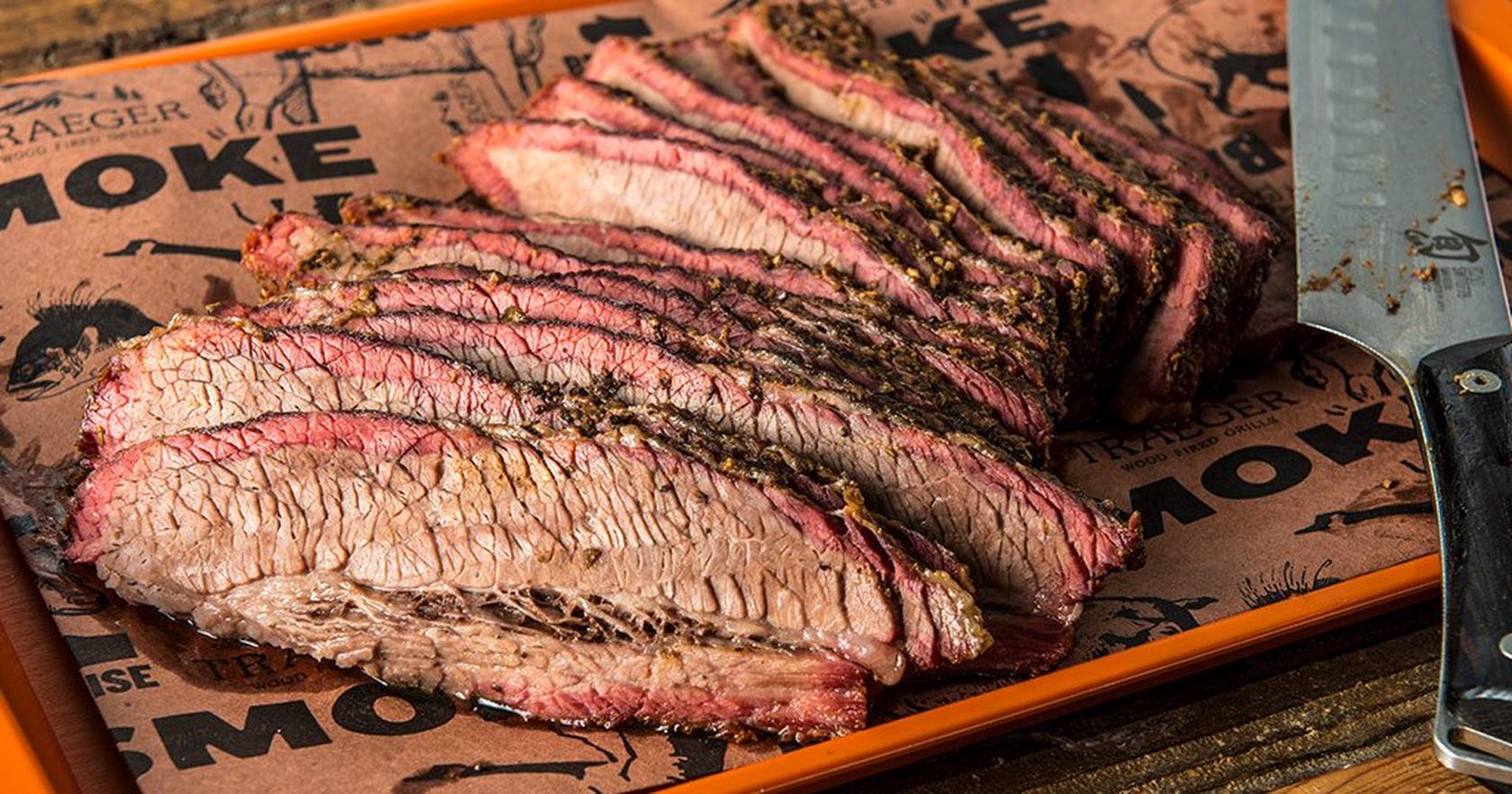
The brisket point is one of two large, boneless cuts of beef from the brisket, or breast meat. The point cut is round and fatty. It's best when cooked low and slow.
The brisket point is traditionally the cut used for corned beef. The cured corned beef packages sold in supermarkets for St. Patrick's Day are often brisket points.
Other Common Names
- Deckle
- Second Cut of Brisket
Primal Cut
- Brisket Primal

Brisket Point Cooking Methods and Tips

The best ways to cook a brisket point.
Typical Cooking Methods
- Smoking
- Braising
- Boiling
General Cooking Recommendations
Brisket point comes from the breast of the animal and is somewhat tough because the breast is a commonly used muscle. Happily, the cut is blessed with plenty of intramuscular fat that adds flavor and moisture during cooking.
So by seasoning the meat well, and cooking it at a low temperature for several hours, it's possible to get extremely flavorful, tender bites from the point.
How to Cook Brisket Point on Your Traeger
One excellent preparation for brisket point on your Traeger is to make smoked corned beef. You can use the packaged kind from the supermarket, or cure the brisket yourself.
Brisket Point FAQs

Is Brisket Point a Good Cut?
Brisket point is a good cut for low and slow cooking methods. It is the traditional cut for making corned beef.
How Much Does Brisket Point Cost?
The cut will typically cost around $10 per pound, and slightly less for the prepackaged variety. The cut isn't commonly sold in supermarkets, and you may need to special order it.
Another way to get a brisket point is to buy a "whole packer" brisket which includes the point and the flat.
How Do You Know When Brisket Point Is Done?
The meat is done when it is falling-apart tender. You should be able to pull the meat apart easily with a fork. Aim for an internal meat temperature of 204 degrees Fahrenheit.
What Is a Brisket Point Best For?
It is the traditional cut for corned beef, which is cured and then cooked. The cut is best for low and slow-cooking methods like smoking, braising, or boiling.
Can You Buy Just the Point of a Brisket?
The point isn't typically sold in supermarkets — except close to St. Patrick's Day when you'll be able to find it prepackaged as corned beef. If you want a point, and only a point, ask your butcher counter to see if they can cut or special order one.
Which Is Better, Brisket Point or Brisket Flat?
If you like your meat to fall off the bone, you may prefer brisket point. If you like a little more bite to your beef, you might prefer brisket flat.
The point contains more intramuscular fat than the brisket flat, and will typically have a moister, fall-apart texture. Brisket flat is leaner, and will often have slightly more bite when cooked properly — although it's also more likely to dry out.
Can Brisket Point Be Cooked From Frozen?
The cut must be fully thawed before cooking. Never cook it when fully frozen. The frozen interior of the meat will linger at temperatures that encourage dangerous bacteria to form.
Interesting Facts About Brisket Point

Once seen as an undesirable cut because of its shape and the fact that the meat is rather tough, brisket is one of the most sought-after cuts both for barbecue and traditional corned beef.
Corned beef is thought to have originated in Ireland, where fresh cuts were preserved by covering them with large grains of salt, also called corns.
Today brisket point is often sold in a prepackaged, cured form, so people can make corned beef at home.
Brisket Point Identification Codes
The Cattlemen's Beef Board and National Cattlemen's Beef Association identify the brisket point with UPC number 1627. The NAMP (National Association of Meat Purveyors) and IMPS (Institutional Meat Purchase Specifications) code for brisket flat is 120B. This code is used by wholesale meat buyers.
Other International and Cultural Names for Brisket Point
Brisket point is identified as "gros bout de poitrine" in French, which translates to "large end of breast." In Spanish, the cut is known as "punta de pecho" or "chest tip.”
Brisket Point Nutritional Facts
According to the USDA, a braised 6-ounce portion contains 594 calories, 41.4 grams of protein, and 46.2 grams of fat.